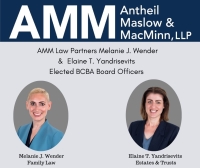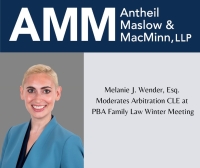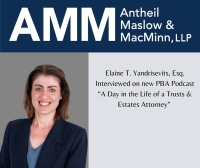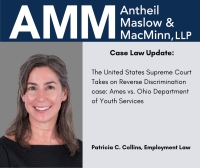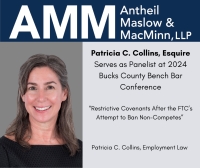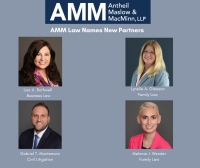On Thursday, December 12th, AMM Law Partners Melanie J. Wender and Elaine T. Yandrisevits were elected to Board Offices at the Bucks County Bar Association’s Annual Meeting.
Melanie J. Wender was named President-elect of the BCBA Board. As President-elect, she will serve with current BCBA Board President Jeremy Puglia in 2025, and will assume the President’s office in 2026. Melanie has served in several roles at the BCBA, including as Secretary/Executive Board member, member of the board of directors, Member Services Committee chair, Bench Bar Committee chair, and as Editor of their “Writs” quarterly magazine . Melanie Wender is a Partner in the in AMM’s Family Law practice group, focusing her practice on issues surrounding the complexities of a divorce, such as equitable distribution, custody, spousal support, child support, and settlement agreements. Melanie also represents parents in dependency court, and has a well-established practice in Adoption issues.
Elaine T. Yandrisevits was elected to the BCBA as Board Secretary. She previously was elected to the Board of Directors for a term beginning in 2024 and served as the Young Lawyers’ Division representative to the Board in 2023. Elaine will serve as Chair of the BCBA’s Member Services Committee in 2025 and is a past Chair of the Bench Bar Conference Committee, Orphans’ Court Section, and Young Lawyers’ Division. Elaine is a Partner in AMM’s Estates and Trusts practice group, where she concentrates her practice in estate planning, asset protection and wealth transfer planning, planning for retirement and life insurance benefits, probate and estate administration, trust administration, and estate and trust fiduciary litigation matters.
The Corporate Transparency Act: Latest Developments
Written by Joanne Murray
As you probably heard, the U.S. District Court for the Eastern District of Texas issued a nationwide preliminary injunction on December 3, 2024 to stop the Federal government from enforcing the Corporate Transparency Act (the “CTA”) and the regulations implemented under the CTA. The case is called Texas Top Cop Shop, Inc. et al. v. Garland, et al. The court referred to the CTA as “quasi-Orwellian” and decided that it was “likely unconstitutional.”
It took just two days for the U.S. Department of Justice to appeal this ruling to the United States Court of Appeals for the Fifth Circuit. The Financial Crimes Enforcement Network (FinCEN), the agency charged with enforcing the CTA, issued a press release reassuring reporting companies that no action will be taken against them for failing to file their beneficial ownership information while the Texas court’s order remains in place. FinCEN did not, however, indicate whether it would provide a grace period for filing should the injunction be lifted. It noted that reporting companies may continue to voluntarily file those reports during the period that the stay is in effect. Yesterday, the Department of Justice filed a motion with the District Court to lift the injunction while the Fifth Circuit considers the appeal. If this motion is granted, reporting companies (other than the plaintiffs named in the Texas Top Cop Shop case) would be required to file their beneficial ownership reports as if the District Court injunction had never been entered.
AMM Law Partner and Family Law attorney Melanie J. Wender will serve as moderator for a Continuing Legal Education program, "The Real Lawyers of Arbitration: A Day in the Life of a Family Law Arbitration" at the Pennsylvania Bar Association's Family Law Section Winter Meeting, January 17 - 19, 2025. The Winter Meeting will be held at The Omni William Penn Hotel, Pittsburgh, PA, and registrations are now open.
Elaine Yandrisevits, AMM Law Partner and Trusts and Estates attorney was interviewed on November 3rd for the new Pennsylvania Bar Association’s Real Property Probate and Trust Section podcast. In the episode, entitled “A Day in the Life of a Trusts and Estates Attorney”, Elaine talks about her journey into the world of estate planning and provides a behind-the-scenes look at her daily practice. She also discusses how she has navigated the challenges of growing in her field and how her active involvement in continuing legal education has helped deepen her knowledge and gain confidence in her field. This candid conversation on what it’s like to be a trusts and estates attorney in Pennsylvania is available on online on Spotify.
Elaine concentrates her practice on estate planning, trusts and estate administration and Orphans' Court matters with a focus on special needs trust planning and guardianships. She is a frequent speaker on estate planning, estate administration, and special needs planning for continuing legal education and community organizations.
Elaine Yandrisevits can be reached at eyandrisevits@ammlaw.com or 215.230.7500 ext. 160. Antheil Maslow & MacMinn, LLP is a full-service law firm located in Doylestown, PA. At AMM, we pride ourselves on developing deep relationships with our clients by taking time to understand their goals in order to provide responsive, practical legal advice and aggressive advocacy.
THE UNITED STATES SUPREME COURT TAKES ON REVERSE DISCRIMINATION CASE
Written by Patricia Collins
Reprinted with permission from the October 14th edition of The Legal Intelligencer. (c) 2024 ALM Media Properties. Further duplication without permission is prohibited.
On October 4, 2024, the United States Supreme Court granted certiorari to hear Ames v. Ohio Department of Youth Services, a case from the United States Court of Appeals for the Sixth Circuit. The Plaintiff in Ames alleged discrimination on the basis of her membership in a majority group – that is, Ames is what has come to be known as a “reverse discrimination” case. The case will resolve a split in the circumstances regarding the evidence required for an employee to make a prima facie case of “reverse discrimination”, and could require employers to reevaluate their diversity, equity and inclusion programs.
Mariam Ames is a straight woman, who was employed by the Ohio Department of Youth Services as an administrator. Ms. Ames applied for a promotion and was told during her interview process that she should retire. After the interview, Ms. Ames was demoted, and a gay male was hired to fill her administrator position. A gay woman was hired to the position for which Ms. Ames sought a promotion. Ms. Ames claimed that the Ohio Department of Youth Services discriminated against her on the basis of her sexual orientation. The United States District Court for the Southern District of Ohio granted the employer’s motion for summary judgment, finding that Ames had not shown the “background circumstances” necessary to support a prima facie case that the employer discriminated against a member of the majority group. The court applied the burden-shifting analysis in McDonnell Douglas Corp. v. Green, 411 U.S. 792 (1973), as courts do in all discrimination cases. The Sixth Circuit affirmed, citing its previous holdings that require reverse discrimination plaintiffs to make an additional showing to the McDonnell Douglas prima facie case. Not only was Ames required to show the “usual” prima facie elements, she must also show “background circumstances” to support a reverse discrimination claim. The Sixth Circuit noted that Ms. Ames easily made a prima facie case: her claim was based on sexual orientation, a protected class under Title VII; she was demoted from a position for which she was qualified; and she was replaced by a gay man. But, according to the Sixth Circuit, the case “foundered” on Ms. Ames’ failure to show the required “background circumstances”. The Sixth Circuit noted that reverse discrimination plaintiffs generally meet this “additional” burden, in the absence of direct evidence, by presenting evidence that a member of the relevant minority group made the decision at issue, or that there is statistical evidence of a pattern of discrimination by the employer against members of the majority group. The Supreme Court granted certiorari, and the case will be heard in the upcoming term.
On September 20, 2024, AMM Law Partner Patricia C. Collins, Esq. served as a panelist at the Bucks County Bar Association Bench Bar Conference at Camelback Lodge, Tannersville, Pennsylvania. The seminar entitled, “Restrictive Covenants After the FTC’s Attempt to Ban Non-Competes” included a discussion of the events leading up to the issuance of the Federal Trade Commission’s final rule prohibiting employers from enforcing noncompetition bans against its workforce, exceptions to the pronouncement, federal court rulings, as well as strategies to protect client relationships, trade secrets and proprietary information. Patricia Collins focuses her practice on employment law and commercial litigation.
Patricia Collins at 215.230.7500. To learn more about employment law services at AMM Law, visit ammlaw.com.
Associate
215.230.7500, ext. 166
jonufrak@ammlaw.com
Practice Groups
- Estate Planning
- Estate Administration
- Taxation
Education
- Villanova University Charles Widger School of Law, Juris Doctor, 2022, LL.M: Master of Laws Tax, 2022
- The University of South Florida, Bachelor of Science, Economics, 2016
Bar Admissions
- Pennsylvania
-
Massachusetts
Antheil Maslow & MacMinn, LLP founder and Partner Susan Maslow participated as part of a two-person panel at the ABA Business Law Section Fall Meeting on September 12th in San Diego, California, explaining What is Expected of Me under the New ABA Model Rule 1.16? The Ethical Requirements and Practical Implications of Client Due Diligence. Sue and the Chair of the Business Law Section’s Professional Responsibility Committee, AJ Singelton, explained the targeted changes to Rule 1.16 are intended to clarify that the lawyer is ethically obligated to undertake a reasonable, risk-based analysis to evaluate whether the client is using or seeking to use the lawyer’s services to perpetuate a crime or fraud and has an ethical obligation to be sure he or she acts as an advisor without becoming an enabler. To listen to a recordings of this 1.5 CLE program and its summary of best practices, Click here! Sue also acted as Materials Chair to a second CLE offering during the Fall Meeting titled Evolving Sustainability Requirements: Soft Law to Hard Law to Harder Law jointly presented by the Corporate Social Responsibility Law Committee she has chaired since 2022 and the ESG Subcommittee of Corporate Governance and Federal Regulation of Securities.
AMM Law Partners Thomas Donnelly, Peter Smith and Jessica Pritchard presented contributions of $10,000 each to support education in Bucks County through involvement and partnership with the Central Bucks Education Foundation and the Bucks County Community College Foundation. Both the CBEF and the BCCCF facilitate use of the Pennsylvania Education Tax Credit as a means of directly benefitting local education at all levels. AMM partners Thomas P. Donnelly and Peter Smith hold board of director positions with the respective Foundations. Shown in the picture are Adam Assoian, of Ally Psychological Services, LLC, and TJ Lonergan of the Bucks County Industrial Development Authority and Principal of 3L Advisors. Both Mr. Assoian and Mr. Longergan are Central Bucks Education Foundation board members.
Antheil Maslow & MacMinn, LLP is pleased to announce that four associates have been named as partners of the firm. The new partners represent three practice groups, Lisa Bothwell – Business Law, Lynelle Gleason and Melanie Wender – Family Law, and Gabriel Montemuro – Litigation.
Tom Donnelly, a Senior Partner of the firm, remarked, “AMM is fortunate to have such an impressive group of talented lawyers on our team. All four of our new partners demonstrate excellence not only in their field of practice, but in firm leadership and citizenship in the local legal and charitable community. AMM is well poised for continued growth and success.”
Lisa Bothwell helps her corporate clients implement strategies and find creative solutions during all stages of owning a business. She advises corporate clients on a broad range of matters, including mergers and acquisitions, joint ventures, capital raising events, business separations, and corporate governance.
Lynelle A. Gleason has spent her legal career in Bucks County, representing local families during some of the most trying times of their lives. She concentrates her practice primarily on Pennsylvania family law and estate law. In her domestic relations practice, she handles a variety of family law matters, including divorce, child support, alimony, spousal support, equitable distribution and child custody.
Gabriel Montemuro is a dedicated litigator who helps business clients resolve disputes quickly and efficiently. He represents clients in contract claims, commercial litigation, real estate disputes, and a broad range of other civil matters. Gabe also works with insurance companies and underwriters on complex coverage determinations.
Melanie J. Wender focuses her practice exclusively on all aspects of divorce and family law. She is experienced in all issues surrounding the complexities of a divorce, such as equitable distribution, custody, spousal support, child support, and settlement agreements. In addition, Melanie is also experienced in adoption issues and has assisted many clients in making this life-changing process as seamless and smooth as possible.
Antheil Maslow & MacMinn, LLP is a full-service law firm located in Doylestown, PA. At AMM, we pride ourselves on developing deep relationships with our clients by taking time to understand their goals in order to provide responsive, practical legal advice and aggressive advocacy.

